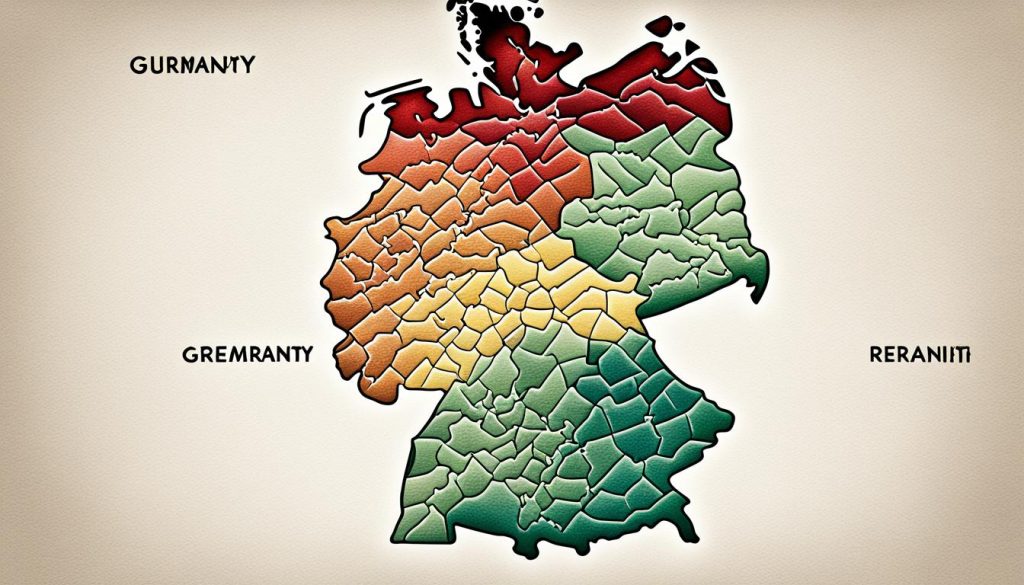Germany is known for its balanced cost of living. It’s both affordable and practical for expats. Unlike some big cities worldwide, Germany’s living costs are reasonable. This is thanks to its well-organised economy and various housing choices.
- Understanding the Cost of Living in Different German Cities
- Why Germany is a Popular Destination for Expats
- Rental Prices Across Germany
- Tips for Saving Money While Living in Germany
- Additional Costs to Consider When Moving to Germany
- How Germany’s Cost of Living Compares to Other European Countries
- Finding Affordable Housing in Major German
- Quality of Life and Work-Life Balance in Germany
- Germany has a reasonably even cost of living
- Source Links
While places like Berlin and Munich may be pricier, smaller towns in Eastern Germany are cheaper. This makes budgeting for expats easier and more flexible.
Key Takeaways
- Germany delivers a balanced cost of living suitable for expats.
- Living expenses vary between major cities and smaller towns.
- Western cities like Berlin and Munich have higher accommodation costs.
- Eastern towns offer more options for affordable living.
- Expats can find diverse housing options to fit different budgets.
Understanding the Cost of Living in Different German Cities
Germany’s cities have different living costs. It’s important to know about expenses. Let’s explore the costs in major cities.
Cost of Living in Berlin
#Berlin is known for being quite affordable. The eastern parts of the city offer lower living expenses. You save money by choosing street food and shopping at markets.
Cost of Living in Munich
#Munich is among Germany’s priciest cities. Its housing costs are much higher than Berlin’s. This makes Munich expensive for both homes and day-to-day expenses.
Cost of Living in Cologne
#Cologne has moderate rental prices compared to Berlin and Munich. It’s good for students because of affordable housing and cheap places to eat.
Cost of Living in Hamburg
#Hamburg offers a balance of rent costs and day-to-day expenses. It’s not as affordable as Berlin, but living there is reasonably priced.
Cost of Living in Frankfurt
#Frankfurt has high living standards, making it one of the costlier German cities. Its accommodation costs reflect its economic level.
In summary, Berlin is the most budget-friendly of the big German cities. Munich has high expenses, mainly from housing. Your choice of city should reflect your lifestyle and what you want in living standards.
Why Germany is a Popular Destination for Expats

Germany is loved by expats for its variety and top-ranked cities. Places like Berlin and Munich offer rich culture and a strong economy. This mix attracts people looking for a great expat life in Germany.
Germany values *work-life balance* greatly. It makes sure people enjoy work and leisure time. High-quality amenities and efficient transport make life here appealing for expats.
The beautiful landscapes in Germany add to its charm. From the Rhine Valley to the Alps, there’s a lot for expats to explore. You get to experience history, nature, and fulfilment in your personal and professional life.
In summary, Germany’s rich culture and economic steadiness offer a superior living standard. The blend of *German quality of life* and career opportunities makes it very attractive.
Rental Prices Across Germany

Rental prices in Germany change a lot based on a few important things. The location, how close it is to city centres, and the area’s economic activities shape the rental market. Knowing these factors can help people decide where to live. They can choose from lively cities or calm countryside areas.
Factors Influiting Rental Costs
Several main elements greatly influence Germany’s rental market:
- Location: Cities like Berlin, Munich, and Frankfurt usually have higher rent. This is because of the high demand and local facilities.
- Proximity to City Centres: Being closer to city centres means rent will likely be higher. This is because of better access and convenience.
- Economic Activity: Areas with growing businesses and jobs tend to have higher rents.
Comparing Urban and Rural Rental Prices
Living in the city vs the countryside in Germany shows a clear cost difference. Cities like Munich or Berlin are pricier. They have busy economies and lots of services. On the other hand, countryside areas offer cheaper options. They are perfect for those seeking peace.
To save on renting, some people share houses, live in flats outside city centres, or choose student housing. These methods help lower costs in the diverse rental market.
Tips for Saving Money While Living in Germany

Moving to Germany is exciting but can be costly. Yet, it’s possible to save money and still have fun. Here are several tips to make your budget last in this beautiful country.
Flat or House Shares
Choosing to live with others in a flatshare or house share is a great way to save. Rent becomes more affordable compared to living alone. It’s also a chance to meet people and experience German culture up close.
Student Accommodations
For students, campus housing is a wallet-friendly option. German universities often offer low-cost living spaces for their students. These places let you live affordably, so you can concentrate on your studies and not on rent.
Discount Supermarkets
Shopping at stores like Lidl and Aldi can also cut down your expenses. They offer quality products at lower prices. Making these stores your regular choice can shrink your food and everyday items budget.
Travel Cards for Students
For commuting, student travel cards are a big save. They come with discounts on the public transport system in many cities. With these cards, traveling is cheaper, letting you explore without spending too much.
By living in shared spaces, using student accommodations, shopping at discount stores, and getting a travel card, you can live well in Germany without overspending. These suggestions will lessen your financial worry and let you fully enjoy your German adventure.
Additional Costs to Consider When Moving to Germany

Moving to Germany is exciting, but it’s important to think about the costs. Knowing these costs makes your move smoother. It also helps you plan your relocation budget better.
Relocation Expenses
Planning your move to Germany means thinking about moving costs. Costs to consider include:
- Deposits and first month’s rent
- Fees for administration and paperwork
- Moving services for your things
- Setting up healthcare and commuting
Utilities and Bills
Part of your relocation budgeting should include German utilities. You’ll usually need to pay monthly for:
- Electricity
- Water
- Gas
- Internet and phone services
Knowing about these costs will help manage your finances each month in Germany.
How Germany’s Cost of Living Compares to Other European Countries
When we compare the cost of living in Europe, Germany shows moderate expenses. We’ll look at how Germany matches up with Spain, Italy, and Poland.
Cost of Living in Germany vs. Spain
Comparing Germany and Spain shows some interesting differences. Germany’s prices are usually higher, but the gap is smaller than you might think. Grocery and utility costs can differ, but housing and transport are quite similar.
Cost of Living in Germany vs. Italy
Looking at Germany and Italy, Germany is a bit pricier. Yet, the higher salaries in Germany often offset this, leading to a good standard of living.
Cost of Living in Germany vs. Poland
Compared to Germany, Poland is much cheaper in most spending areas. But, lower earnings in Poland mean the cost advantage is less clear, keeping Germany appealing for its balance of living costs and wages.
Finding Affordable Housing in Major German
Finding a place to live in big German cities like Berlin, Munich, and Hamburg can seem hard. But, if you do your homework and plan well, you can find places that won’t break the bank.
One smart way to save money is to look into sharing a place with others. This approach is kind to your wallet and lets you make new friends. Plus, you can split the costs of bills and internet.
For students, it’s key to apply for student housing early on. With lots of people wanting the same spots, they fill up fast. By acting early, you boost your chance of getting a good, cheap place near your university.
Another tip is to think about living a bit outside the city center. Places in the suburbs tend to be cheaper than in the heart of the city. You’ll save money and still be able to get to the city easily thanks to good transport services.
So, to sum up, mixing different approaches like opting for shared spaces, applying for student housing early, and looking at suburbs can really help. This way, finding affordable housing in Germany’s big cities becomes much more manageable.
Quality of Life and Work-Life Balance in Germany
Germany is known for its high life quality. It blends a strong economy with rich culture, creating a well-rounded life. The country strives for a good balance between work and personal life, boosting both happiness and work output.
German cities have great infrastructure. They offer different work options like working from home, starting your own business, or traditional office jobs. Such choices greatly improve people’s work life in Germany.
Being on time and working efficiently are key in German workplaces. This leads to a balanced life. Bosses help employees keep work and home life separate, showing how important balance is.
Germany’s focus on public services, health, and fun boosts quality of life. Public transport is easy to use, and there are lots of parks. These benefits make work life better.
Germany has a reasonably even cost of living
Germany stands out in Europe for its balanced living costs. Compared to other countries, the difference in living expenses between cities and rural areas in Germany is small. This means people can enjoy the same standard of living in Berlin or a smaller town like Passau.
The country’s detailed urban planning and strong public services help keep things balanced. While cities like Munich or Frankfurt might have higher housing costs, affordable options in Dresden and Leipzig help even things out. This ensures all residents can enjoy a good life, even in pricier areas.
Healthcare, education, and public transport are accessible to everyone in Germany. This makes life good whether you’re in a busy city or the countryside. So, no matter where you live, you can expect great amenities and a high quality of life.











